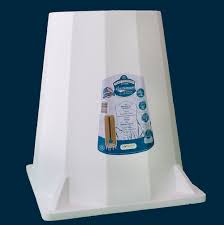The biggest threat to our rose garden is not snow and ice, but a warm winter. A very late fall, like last year's, lulls us into thinking the flowers are safe, but that is not so.
Snow forms an effective blanket over soil and plants, which not only preserves moisture, but keeps the killing frost away from soil creatures and tender plants. As we are reminded from Isaiah 55, the Word of God is not only compared to rainwater, but also to snow. The final benefit of snow for the winter is melting into the soil to give a powerful boost to all life, plants in particular.
I was very concerned for the roses in New Ulm, Many-snow-tah, so I studied how to protect them for the winter. Plastic snow cones - still being sold - did not seem to be a good solution. They might be too warm at times and likely to promote killing molds by sealing in the moisture.
 |
| I have my doubts about this model. |
A better solution was a chicken wire fence around the small rose garden and leaves stacked up four feet high. In the spring I removed the wire but not the leaves - the papery remains were absorbed into the soil by earthworms and mites. The leaves formed air pockets around the roses that insulated them from 60 below wind chill. The leaves began the rotting process during the winter and finished the rot when spring arrived. Birds cheerfully flipped leaves over to expose the soil creatures trying to eat their dinner, so eaters were eaten and the soil improved.
My first gardening investment in Springdale was chicken wire for the compost pile. Mr. Gardener and I put all our extra greens and a few leaves into it for years, plus a handful of eager red wiggler earthworms. As often as I filled it to the brim, it sank down again and fed my natural earthworm farm. The vegetation around the compost flourished.
 |
| White-washed sepulchres - admit it - you already thought that before the caption was added. |
Clerical Collars
Another solution for roses is the plastic collar around each plant. they remind me of the Oreo collars favored by Ft. Wayne graduates.
 |
| This is more Roman than Anglican, a Friar Tuck shirt barely able to be buttoned. OSHA has labeled it a workplace hazard, especially during long "working" lunches. |
The rose collar is snapped into place around the base of the plant, the void filled with mulch (leaves, shredded wood, grass). The collar can be removed in the spring, though it is handy for protecting the plant from the onslaughts of the weed-eater.
 |
| This is the collar I did not buy - more photogenic than white plastic, but more expensive. |
Like snow, the mulch will provide air pockets to insulate the plant from the freezing, dry winds that attack the bud union. The grafted rose will continue to produce roses from the wild rose base, but the hybrid tea grafted onto it will die during a dry winter without snow, even when the weather is deceptively warm.
Best Outcomes for the Soil and Plants
The purpose of Creation Gardening is to save money and labor by eliminating the delusional methods of chemical growing. When left up to Creation, soil is moist, packed with life, easily dug, and ready to grow plants. Earthworms till and fertilize, along with a host of other creatures.
When I had tree stumps all through the rose garden, one visitor said, "It looks like a cemetery." All those stumps were there to provide food for the soil, safe areas for birds to spot insects and preen their feathers. One stump is now so covered with Trumpet Vine that it looks ancient. Other stumps serve as bases for solar lights at night.
Lutherdom is a howling, dry desert today - not for trying Luther's doctrine but for ignoring the Reformation altogether. All the chemical enhancements applied by Fuller Seminary, the Fulleroids, Willow Creek, and Groeschel/Stanley have destroyed the congregations and synods. There are exceptions - where pastors have not been seduced by Thrivent funds and anti-Word programs bought from snake-oil salesmen.
Creation pastors can be identified easily, just as the frauds can be. Ask the pastor what he thinks about Luther or the efficacy of the Word.




